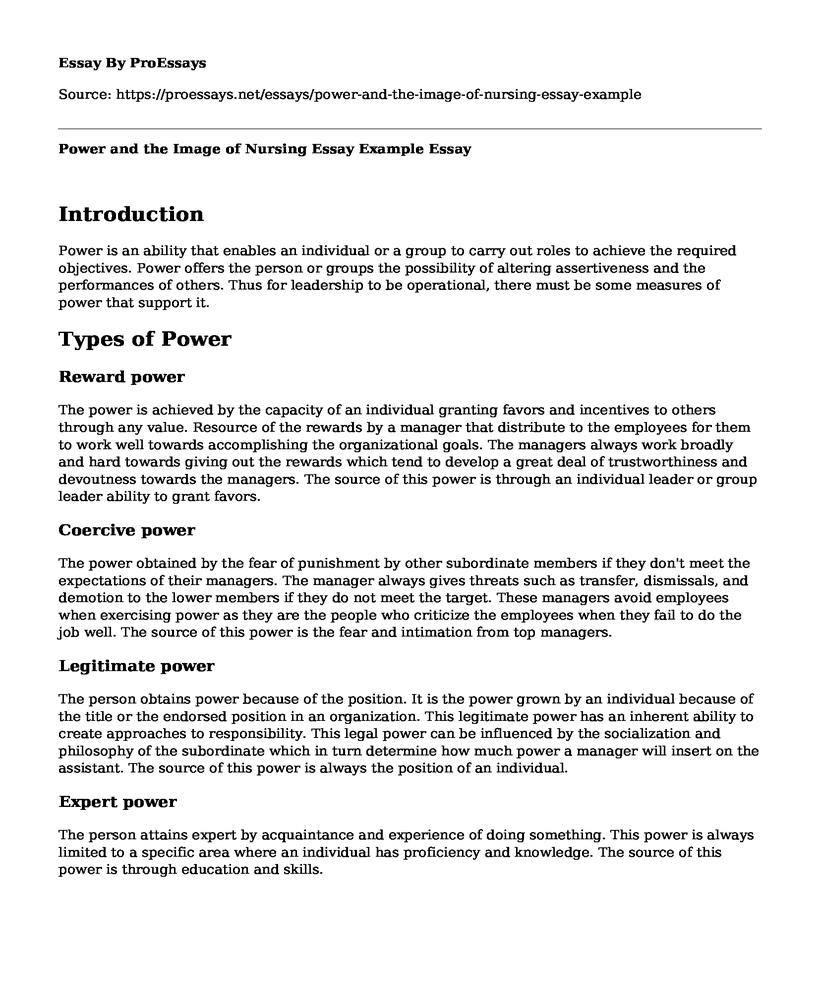Introduction
Power is an ability that enables an individual or a group to carry out roles to achieve the required objectives. Power offers the person or groups the possibility of altering assertiveness and the performances of others. Thus for leadership to be operational, there must be some measures of power that support it.
Types of Power
Reward power
The power is achieved by the capacity of an individual granting favors and incentives to others through any value. Resource of the rewards by a manager that distribute to the employees for them to work well towards accomplishing the organizational goals. The managers always work broadly and hard towards giving out the rewards which tend to develop a great deal of trustworthiness and devoutness towards the managers. The source of this power is through an individual leader or group leader ability to grant favors.
Coercive power
The power obtained by the fear of punishment by other subordinate members if they don't meet the expectations of their managers. The manager always gives threats such as transfer, dismissals, and demotion to the lower members if they do not meet the target. These managers avoid employees when exercising power as they are the people who criticize the employees when they fail to do the job well. The source of this power is the fear and intimation from top managers.
Legitimate power
The person obtains power because of the position. It is the power grown by an individual because of the title or the endorsed position in an organization. This legitimate power has an inherent ability to create approaches to responsibility. This legal power can be influenced by the socialization and philosophy of the subordinate which in turn determine how much power a manager will insert on the assistant. The source of this power is always the position of an individual.
Expert power
The person attains expert by acquaintance and experience of doing something. This power is always limited to a specific area where an individual has proficiency and knowledge. The source of this power is through education and skills.
Referent power
It is a kind of power a person obtained through identification by others. Some people can achieve it through association with the powerful. The perception of the power is always through an individual charisma, the way individual acts or talk, and the organizations the person belongs. Thus the power can be developed by what others perceive an individual to be powerful. The source of this power is through association with others.
How can someone increase Nursing power base
For one to gain human-professional authority in nursing occupation needs courtesy on social, moral, proficient, single and organizational capacities. Individuals do not develop power and authority by allocated power and compelling benefits of prospects and the resources only, but an individual should have an assertion of human and moral features that will maintain the control. Another strategy is to be an expert in nursing related areas and identify a good and positive role model that mentor you.
References
Marquis, B. L., & Huston, C. J. (2017). Leadership roles and management functions in nursing: Theory and application (9th ed.).
McMurry, T. B. (2011). The image of male nurses and nursing leadership mobility. Nursing Forum, 46(1), 22-28.
Cite this page
Power and the Image of Nursing Essay Example. (2022, Dec 12). Retrieved from https://proessays.net/essays/power-and-the-image-of-nursing-essay-example
If you are the original author of this essay and no longer wish to have it published on the ProEssays website, please click below to request its removal:
- Women's Health and Nutrition During Breastfeeding
- The CEO Compensation Paper Example
- Radon: A Silent Killer With Life-Threatening Effects - Essay Sample
- Exploring Smoking Habits Through Research: Examining Therapeutic Counseling
- Paper Example on Technology & Creativity: Examining the Impact & Securing the Future
- Paper Sample on Global Health Informatics: A Historical Perspective
- Rural Healthcare Quality & Accessibility: Population-Centered Policies Essay







